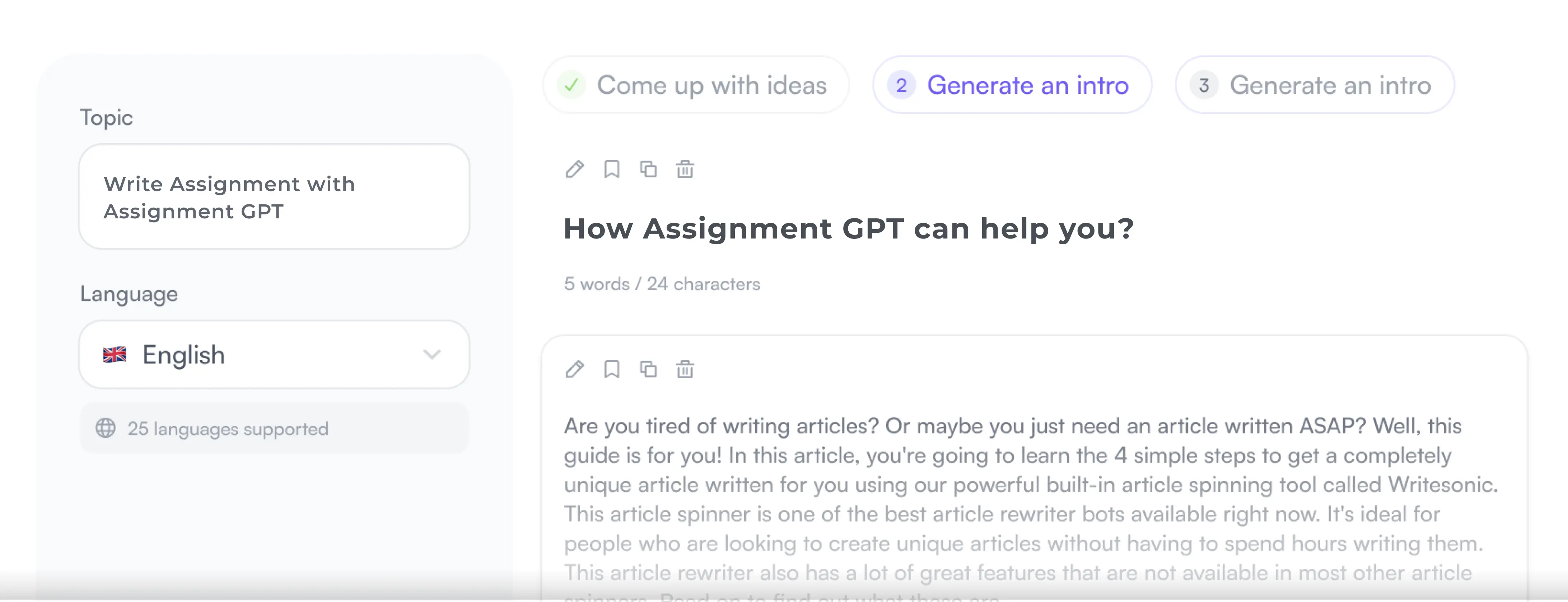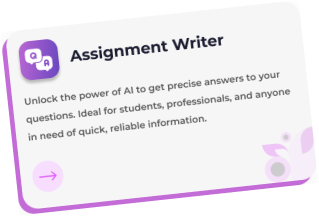AssignmentGPT Blogs
If you are also a student, then tell me honestly how long you open books daily to study and for how long you manage to study with concentration, maybe 10 minutes or a maximum of 30 minutes. Because today's short content has reduced the concentration time span of students considerably, students are not able to get motivated to study. If you are also stuck in the same loop, then it is okay, because there are many people in the same situation as you.
Actually, student life is very busy and stressful, because exams and assignments come very soon, and some students also do part-time jobs, due to which it becomes very difficult to manage everything and because of this, many students lose focus on their studies.
If you are also facing all these problems, then after reading this detailed article, you will be able to manage your academic life more effectively and productively, and I will tell you all the tips from my personal experience.
Quick Summary
If you're struggling to study or procrastinate a lot, it's likely due to social and environmental factors. Let's explore how to motivate yourself to study. First, you need to set clear goals and design your environment and routine so that you don't experience any distractions. You can also break down your tasks into smaller chunks and use smart time-management techniques like the Pomodoro method.
And you can increase your motivation through rewards, apart from this, self-talk will also be very important and try to have positive self-talk as well and through this, you can also create accountability.
Our focus in this article:
- What is the reason for students not getting motivated to study?
- How can students balance study and work in their lives?
- I will give you the best tips from my personal experience so that you will be able to manage your studies effectively.
Understanding Motivation
Before delving into how to focus on studies, it's important to understand why motivation ultimately wanes. Our social lives today are often filled with distractions. And as we know, motivation isn't magic; it's a combination of strong energy, clarity, and a strong mindset. When these qualities are missing, maintaining focus becomes incredibly painful.
Why Motivation Fades
Overwhelm: Students face so many assignments and exams regularly that coping with stress can feel impossible.
Distractions: According to a recent report, 70% of city college students are addicted to phones, games, and social media, and this wastes their attention.
Lack of Purpose: If you don't have a goal or commitment, it's very difficult to continue studying, and maintaining a strong commitment is crucial.
The Science Behind Motivation
Let's understand what motivation really is. According to psychologists, teenage motivation is divided into two types: intrinsic motivation and extrinsic motivation. Let's understand these.
1. Intrinsic motivation: When you genuinely enjoy studying and learning, you feel intrinsic motivation, and this habit is mostly seen in topper students.
2. Extrinsic motivation: When you think that getting good grades will bring you more rewards, the motivation that comes in such a situation is extrinsic motivation.
Set Yourself Up for Success
Let me share tips from my personal experience on how to create a better roadmap and study plan for yourself, so that your motivation isn't temporary and you can follow a long-term plan.
1. Set Clear Goals & Create a Plan
You've probably noticed that when you know when and how to do something, it's much easier to do it. You can start this by setting smart goals in real life, which you can achieve by following specific, measurable, achievable, relevant, and time-bound rules.
When you go to study, don't say, "I'll study math tonight," but instead, "I'll complete 15 algebra problems in the next 40 minutes." When you have a deadline, the chances of distraction are significantly reduced.
Short-term goals keep you focused daily
When we set long-term goals, we feel like we've achieved a big goal, like improving our grades in college for a year.
That's why academic counsellors always advise breaking your tasks into smaller parts so you don't end up with a rigid plan. For example, never plan to write 25 pages today, but instead think, "I just want to write 1 page a day."
2. Prioritize Your Assignments
One thing I learned in school: Not all tasks in school or college are equal. Some are very difficult and take a long time to complete, while others are very easy. Once you complete the easy tasks, the rest seem easier.
Whatever assignments you write, try to rank them according to their importance and complete them when you have enough energy. Complete the hard tasks first.
This will not only boost your productivity but also help you build a sense of accomplishment early on.
Design a Productive Environment
To study productively, it's crucial to have a good environment around you. Studying for 15 hours doesn't mean you're focused.
1. Remove Distractions
A lot of research has shown that humans can never multitask, and the human brain isn't designed that way. If you're constantly on Instagram, WhatsApp, and doing your physics homework, you'll never be able to study with focus. All these distractions ruin your focus. Therefore, it is very important to create a study zone so that your brain performs accordingly.
To do this, avoid keeping your phone in your study room and turn off app notifications.
Block any distracting websites.
Always keep your desk clean so that your mind doesn't feel cluttered by the environment.
2. Add Productivity Triggers
A good environment doesn't mean removing everything; it means keeping things in your environment that motivate you to study.
For example, a good lamp = study mood on.
Apart from this, you can use background music or white noise for proper concentration.
Study on a specific chair or corner on a daily basis. This will keep your brain focused, and being in that place will automatically trigger it to study.
Personally, I usually use a dim candlelight lamp, and I prefer to study on the floor instead of a table. This helps my brain focus on studies instantly.
Use Time Blocks & Study Techniques
Let's learn about some scientist-approved techniques and tips that can help you manage your concentration and routine.
1. The Pomodoro Technique
One of my personal favourites: In this technique, you'll study for 25 minutes, followed by a 5-minute break. And after four Pomodoros, take a longer break of 15–20 minutes to prevent burnout. This method will never frustrate you and will also help keep your mind relaxed.
Why it works: Our attention span is quite limited, and the Pomodoro technique helps prevent burnout.
2. Structured Scheduling
Whenever you study, instead of making vague plans, create a specific routine or to-do list for your day. This will give you better clarity, for example:
- 5–6 PM: Chemistry formulas
- 6–6:15 PM: Break
- 6:15–7:30 PM: English essay writing
When your study time is structured, your brain respects time more.
Motivation-Boosting Tactics & Strategies
If you're currently very distracted, you'll need a lot of initial motivation and strategies to begin with. Let's understand this in detail.
1. Reward & Incentive Systems
If you've ever trained a dog, you'll know how the brain's reward system works. To a large extent, the human brain reacts similarly. So, you should also create a reward system for studying motivation.
Finish a chapter: Just like if you studied well during the day, you might tell yourself that you'll definitely watch your favourite show for 15 minutes.
Complete 3 Pomodoros: As soon as you consistently follow the routine, be sure to have a snack afterwards.
You can also challenge yourself to not use social media until you finish your studies or homework.
2. Visualize Success & Process
Visualisation is considered a powerful technique. Imagine how good you will feel and how stress-free you will feel if you submit your assignment quickly. The more realistic your imagination, the more your brain will be motivated to complete the task.
I always write in my notebook, "How great my career could be if I get good marks on exams," and it works to a large extent.
3. Stay Positive & Mindset Shift
When you consider studying a heavy task, it will feel like punishment. This requires a mindset shift.
Instead of writing, "I have to do my homework," you can say, "I will learn something new today."
Try to celebrate small wins, even if you only finish two pages.
4. Social Support & Accountability
As we know, humans are social creatures, and we work best when someone is watching.
For this, you can join a study group with your friends.
Try to share your goals with your family members or friends so that you feel a sense of commitment.
Use accountability apps where you share progress
When other family members or friends are involved in specific tasks, the chances of procrastinating are significantly reduced, because you don't want to tarnish your reputation in front of them.
1. Adjust Expectations
Perfectionism kills motivation. Sometimes it's better to be "good enough" than to be nothing. Always aim for progress, not perfection.
2. Use Variety & Breaks
If you find one subject exhausting, switch from one subject to another. You can also take real breaks and walk, stretch, or meditate.
Try to give your brain some rest before the next study session.
Practical Examples / Use Cases
Let me show you some real-life scenarios to see how you can apply this to your own life.
Case 1: I once had to write 15 pages of a history paper, and that too in 5 days. Instead of panicking, I divided my task into 3 pages per day and set aside 1 day for edits, thus completing the task without stress.
Case 2: During exams, my friend and I played quizzes with each other. Explaining concepts to each other not only increases motivation but also strengthens learning.
Future Mindset & Long-Term Motivation
Even if you've started studying, it's crucial to develop proper long-term motivation to continue.
1. Connect With Your "Why"
Studying becomes meaningful only when you start with a larger purpose in mind. If you're studying for a dream or to gain independence, it's much easier to consistently complete tasks.
2. Build Habits Over Motivation
Motivation is like fuel; once it runs out, you lose the desire to work. However, habits are what motivate you to continue working long-term. Therefore, treat studying like your routine, not as motivation.
Conclusion
Studying or doing homework doesn't require any motivation or inspiration, nor does it require a magical mind. You can start by naturally creating the proper systems, environments, and mindsets. Set goals, break them down into tasks, and reward yourself accordingly. Remember, this is a long-term vision that can be achieved.
The Worst Truth: You may not feel motivated to study in the beginning, but as you maintain these habits and follow them with discipline, your consistency will prove valuable.
For an extra boost, you can use AI tools like AssignmentGPT AI, which can greatly help and support you with your homework and provide step-by-step guidance for studying, providing instant explanations and personalized study help. It's like having a 24/7 study assistant, allowing you to track your studies.
FAQs
1. What should I do if I keep procrastinating even after planning?
2. How many hours a day should I study to stay productive?
3. Why do students lose interest in high school/college work?
4. Is it better to study at night or in the morning?
5. How can I make studying fun?
6. How do I deal with stress and burnout while studying?
7. How can I stay motivated to complete homework?
Content writer at @AssignmentGPT
Ashu Singh, content writer at AssignmentGPT, crafting clear, engaging content that simplifies complex tech topics, with a focus on AI tools and digital platforms for empowered user experiences.
Master AI with
AssignmentGPT!
Get exclusive access to insider AI stories, tips and tricks. Sign up to the newsletter and be in the know!

Transform Your Studies with the Power of AssignmentGPT
Empower your academic pursuits with tools to enhance your learning speed and optimize your productivity, enabling you to excel in your studies with greater ease.
Start Your Free Trial ➤Start your success story with Assignment GPT! 🌟 Let's soar! 🚀
Step into the future of writing with our AI-powered platform. Start your free trial today and revolutionize your productivity, saving over 20 hours weekly.
Try For FREE ➤








